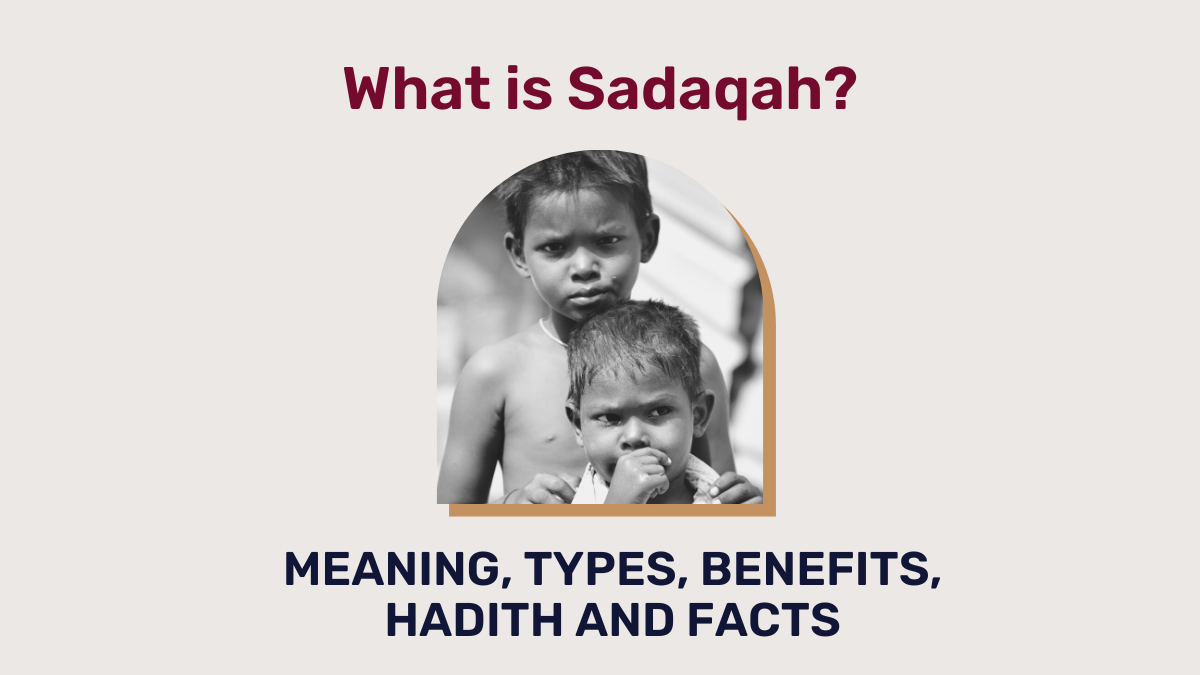Have you heard of the term “Sadaqah Donation” and ever wondered what the meaning behind it is?
Sadaqah is an Islamic term for voluntary acts of charity. The usual interpretation is “charity offered out of love or affection” rather than “Sadaqah donation.” Practised by both Muslims and non-Muslims, Sadaqah embodies the spirit of giving, caring and sharing in any form.
Through this article, we will examine Sadaqah Donation in greater detail – its definition, types, benefits and historical roots. There are certain little-known, but crucially important, details about Sadaqah that we will investigate as well. Furthermore, we will look at key hadiths (sayings) from the prophet Muhammad (PBUH) that emphasise the importance of providing Sadaqah from our wealth.
Definition of Sadaqah:
Sadaqah is an Arabic word that comes from the root s-d-q, which means “righteousness” or “truth.” It is usually translated as “charity,” but it can also mean any kind or generous act. Sadaqah is seen as a form of worship in Islam, and people are strongly encouraged to do it. It is a way of expressing gratitude to Allah (SWT) for the blessings He has bestowed upon us and is an act of selfless giving to those in need.
Types of Sadaqah:
There are two primary types of sadaqah: compulsory (fard) and discretionary (nafl). Obligatory Sadaqah includes zakat, which is a mandatory form of charity that Muslims must pay each year. It is calculated as a percentage of one’s wealth and is used to help the poor and needy. Voluntary Sadaqah, on the other hand, can take many forms such as giving money or food to those in need, helping someone in need with their daily tasks or even simply smiling at someone.
Benefits of Sadaqah:
Sadaqah donation is not only beneficial to those who receive it, but also to the giver. Sadaqah has been shown to improve one’s emotional and physical well-being as well as one’s sense of fulfilment in life.Studies have found that people who give Sadaqah are more likely to experience feelings of happiness and contentment, as well as improved physical health. {Common mistakes to avoid}
Hadith on Sadaqah:
The Prophet Muhammad (PBUH) said: “Charity is a necessity for every Muslim” (Sahih Bukhari). This hadith emphasises the importance of giving Sadaqah in Islam and serves as a reminder that it is our duty to help those in need.
• “Whoever gives charity equal to a date from his honest earnings – for Allah accepts only that which is pure – Allah will take it in His right hand and tend it for the one who gave it as any one of you tends his foal, until it becomes like a mountain.” (Bukhari)
• “The best charity is that given in Ramadan.” (Tirmidhi)
• “Charity extinguishes sin as water extinguishes fire.” (Tirmidhi)
• “Whoever gives charity equal to a grain of wheat will be rewarded with tenfold the amount.” (Bukhari)
• “The best charity is that given in secret.” (Tirmidhi)
Facts about Sadaqah:
• Sadaqah is not only about giving money but also about giving of oneself and one’s time.
• Sadaqah can come in the form of both monetary donations and non-monetary acts of charity.
• Sadaqah is a way of expressing gratitude o Allah (SWT) for His blessings.
• Sadaqah is not only about giving money but also about giving of oneself and one’s time.
• Sadaqah can come in the form of both monetary donations and non-monetary acts of charity.
• We can offer Sadaqah to anybody, not just the poor.
• Sadaqah is a way of expressing gratitude to Allah (SWT) for His blessings.
• We can offer sadaqah donation in many different ways, such as with a smile, kind words, or even a hug.
• Sadaqah is a way of purifying one’s wealth and earning the pleasure of Allah (SWT).
• Giving Sadaqah can help to reduce stress, anxiety and depression.
• When you give Sadaqah, you get many times as much back as you give.
Sadaqah is a very important part of the Islamic religion, seen as a way to clean up one’s wealth and please Allah (SWT).It can take many forms, from giving money or food to those in need, helping someone with their daily tasks or even simply smiling at someone. The rewards for giving Sadaqah are multiplied many times over, and it can have a positive effect on one’s mental and physical health.
Sadaqah is a religious act that can be done in many different ways.It can be as simple as giving a smile or kind words to someone, or it can be more involved such as helping someone with their daily tasks or donating money to charity. Regardless of the form, Sadaqah is a way of expressing gratitude to Allah (SWT) for His blessings and purifying one ’s wealth. It is also a way of helping those in need and earning the pleasure of Allah (SWT).
The rewards for giving Sadaqah are immense, both in this life and the hereafter. Allah (SWT) promises to reward those who give Sadaqah with an increase in their wealth and status, as well as forgiveness of sins. Additionally, giving Sadaqah can help to reduce stress, anxiety and depression.
Remember that Sadaqah is a voluntary almsgiving performed only for the pleasure of Allah (SWT) and not for any other purpose. The giver should do it with a generous spirit and a sense of modesty, expecting nothing in return. ()
Hadith:
The Prophet Muhammad (peace be upon him) said: “Charity does not decrease wealth” (Sahih Bukhari).
This hadith emphasizes the importance of giving Sadaqah, as it will not decrease one’s wealth but rather increase it. It’s a good reminder that the sole motivation for making a Sadaqah donation should be to earn the pleasure of Allah (SWT).
Facts:
• Donating to people in need, whether by monetary or food aid, physical assistance, or even just a friendly smile, is an act of worship known as sadaqah.
• Sadaqah is a form of charity that is rewarded many times over, both in this and the next world.
• Giving Sadaqah can help to reduce stress, anxiety and depression.
• It is important to remember that the only reason to give Sadaqah is to please Allah (SWT), not for any other reason.
• If you want to offer someone sadaqah, you don’t have to let them know who provided it to them.
• Muslims who satisfy specific criteria are obligated to pay Zakat, which is another name for Sadaqah.
• The charitable act of giving known as sadaqah is not obligatory but is highly recommended.
• It is critical to remember that Sadaqah should present with humility and kindness, not with pride or arrogance.
Sadaqah is a very important part of the Islamic religion. It’s considered a means of purifying one’s wealth and gaining favour with Allah (SWT). It can take many forms, from giving money or food to those in need, helping someone with their daily tasks or even simply smiling at someone.
Sadaqah, or charity, is a form of altruistic giving that brings several benefits, including the alleviation of emotional strains like stress, anxiety, and despair. Note: Remember that the only reason to give Sadaqah is to please Allah (SWT), not for any other reason.
Sadaqah can also be given as Zakat, which is a form of charity that Muslims who meet certain requirements must pay. It’s important to remember that Zakat shouldn’t be given out of pride or arrogance, but rather with humility and generosity. Also, it should be given to the people who need it the most, not just to friends and family.
Sadaqah can also be offered voluntarily via acts of generosity; this is not required but is strongly recommended. This type of Sadaqah can take many forms, from giving money or food to those in need, helping someone with their daily tasks or even simply smiling at someone. Donating to Sadaqah (charity) of your own own requires you to put others’ needs before of your own.




















